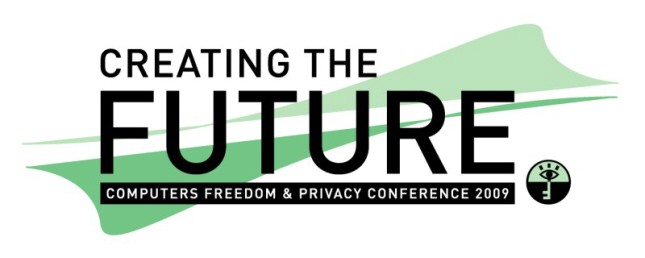
“Fight for me!”
— a privacy-loving Facebook friend, wishing me luck at the conference
Here’s our opportunity to realize the promise of the Net that was so present in 1990s when CFP started.
— Deborah Pierce on the CFP blog
The program for this year’s Computers, Freedom, and Privacy conference is outstanding even by CFP’s high standards. The mix of technology, legal, policy, and activism perspectives is particularly strong this year, and with the new administration and Washington DC location there’s significant involvement by government employees for the first time since the 1990s. As well as CFP regulars like Jennifer Grannick, Jim Harper, Ed Felten, Nicky Ozer, Alessandro Acquisti, Stewart Baker, and Lillie Coney, speakers incude first-timers like Marcy Wheeler, Dori Maynard, Paul Ekman, Shireen Mitchell, Rebecca Mackinnon, Nancy Scola, and Ari Melber. Don’t take my word for it — check out the program and prepare to be impressed.
Best of all, with streaming video, the #cfp09 Twitter backchannel ,* live-blogging, and a community wiki, the conference will be more accessible onine than every before.   Kudos to Katy Nelson of the ACLU and Robert Guerra of Freedom House for taking the lead with the video streaming, and to all the volunteers of the online visibility team for all the great work on the blog, Twitter, and Facebook. The online schedule has details, we’ll do our best to keep the web site updated regularly, and the Twitter feed will be best way to keep up what’s going on.
As well as setting ambitious diversity, visibility, and community goals for the online visibility project, my contributions to CFP this year include working with Deborah Pierce, Shireen Mitchell, and Sarah Granger on Monday’s Twittering in the trenches workshop; helping Katrina Neubauer and Robert Guerra on Thursday’s Online activism around the world panel; organizing Wednesday’s keynote by Willow Witte of Join the Impact and DREAM Activist Mohammed Abdol; and a Wednesday night birds-of-a-feather session on New Strategies for fighting FISA and the PATRIOT Act. Notice a theme here?
There was a lot of skepticism when Deborah first proposed a social network activism strategy for privacy and civil liberties at Andrea Matwyshyn’s Data Devolution conference** and a CFP session in 2006. Since then, though:
- in 2007, Stop Real ID Now! demonstrated that an unlikely alliance of libertarians, agriculturalists, migrant rights activists, transgendered people, and biblical literalists could contribute to a civil liberties success
- in 2008, Voces Contra las FARC went from a Facebook group to millions of people in the streets in six weeks, the Obama campaign showed the power of social networks, and Get FISA Right, Twitter Vote Report, Voter Suppression Wiki, Join the Impact all used a wiki/social network approach to reach thousands of people and hte mainstream media
- in early 2009, EPIC joined forces with grassroots organizers and 100,000 users in the successful “Facebook TOS” flash action protests
So people are starting to come around 🙂
Too often, privacy and civil liberties advocates wind up talking to themselves. Speakers at most CFPs are predominantly white, male, older, and highly-credentialed; the audience is a little more diverse, but plenty of people who care about CFP can’t afford the time or money to get to the conference in person. Organizations too often rely on email-based outreach and static web sites, which makes it impossible to engage with the broad community, so it’s very easy to get cut off from most people’s reality.
Social network sites, by contrast, are filled with real people: moms, “millennials”,*** Obama and Ron Paul supporters, immigrants and peace activists who are sick of being the targets of government surveillance. Many of they care passionately about privacy and civil liberties, have perspectives that get virtually no attention in the media, want to learn more, and will find the time to help. We need to work with them if want to seize the opportunity that Deborah talked about and realize the transformational potential of the internet.
True, sites like Facebook are creepy panoptic environments that make money by exploiting users’ personal information and don’t even offer a pretense of due process or user rights. But hey, if changing the world were easy, everybody would do it. And organizations like PrivacyActivism, EPIC, EFF, and CDT are increasingly moving out of their comfort zones and engaging on social networks.
So the timing’s perfect for CFP09 to be a catalyst to social network activism: sharing best practices for education and technology, bringing in youth and international perspectives, highlighting success stories — all in a context of outstanding legal and policy experties. The Strategies for fighting FISA session is one example; I also expect we’ll see discussions of the Privacy Coalition’s Whole-body imaging campaign, CDT’s brilliantly-timed Privacy Act rewrite, and a lot more.
At last year’s CFP Susy Struble and I had led “Dear POTUS”, a collaboratively-written open letter to the presidential candidates; six weeks later, I was part of the group of Obama supporters who wrote an open letter on FISA — and he wrote back, on my.barackobama.com and the Huffington Post, in a moment that’s repeatedly cited as a watershed for online activism. Lillie Coney’s panel on e-Deceptive campaign practices last year helped lead to the Voter Suppression Wiki and some key early publicity for Twitter Vote Report. And I’m no exception; plenty of others had similar experiences.
I can’t wait to see what this year’s conference brings!
jon
* our thanks to Twazzup for setting up a custom search page at http://cfp09.twazzup.com
** the same conference where I presented my joint work with Sarah Blankinship on the implications of “computer science as a social science” for computer security, a theme being explored at CFP this year in a breakout session on The Psychology of Security. Shameless plug: Sarah and I will be presenting Securing With the Enemy: Social Strategy and Teams of Rivals at Shakacon on June 11-12. More on that subject soon!
*** the under-30 generation who sees email something they use for work and to keep in contact with older relatives
Leave a Reply